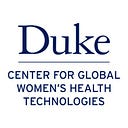GWHT Research Teams
Part 3: Cervical Cancer Team: Developing Interventions for Cervical Cancer Screening and Diagnosis
During the month of November, we have been recognizing the research efforts and accomplishments of our three research teams: breast cancer, cervical cancer, and ethanol ablation. This week we caught up virtually with the Cervical Imaging Team to learn more about how they adapted to all of the changes of 2020.
Marlee Krieger, Executive Director for the Center for Global Women’s Health Technologies, spoke to us about some of the major accomplishments of this team.
Our team of talented women has focused on the integration of our mobile health technologies with our imaging devices. One of our biggest accomplishments during the pandemic has been the development and validation of a mobile health software application which allows for image acquisition, annotation, archiving, and transmission and supports both the Callascope and Pocket Colposcope. Along a similar vein, we are proud to announce both the Callascope and Pocket Colposcope will be available for commercial purchase from Calla Health by the start of 2021. — Marlee Krieger
Keep reading to learn more about the specific accomplishments this team has made towards screening and diagnosis of cervical cancer!
We completed our first Callascope pilot study! The study was conducted in Peru with our collaborators at the University of Cayetano and the HOPE project, led by Dr. Patricia Garcia. — Libby Dotson
- We have scaled up our efforts around the WISH model in Kenya with collaborator Dr. Megan Huchko. We are planning to implement the model in the Spring of 2021.
While the software development work was not impacted significantly by COVID-19, the ability to test, gather feedback and and iterate on the app has been impeded. We focus on the tasks that can be done — how to guides, video tutorials, feature development/bug fixes. — Akshata Ladwa
Some of our advancements include:
- Manufacturing and assembly of the first clinical evaluation unit for the Pocket Colposcope.
- We have been consolidating various versions of the Calla Health app to create an MVP that supports both the Pocket and Callascope for eventual use in upcoming studies.
- Receiving our second Phase 1 SBIR which was awarded to Calla Health. GWHT Alum, Dr. Mercy Nyamewaa Asiedu, will lead as PI on an SBIR grant, “Optimizing delivery of ethyl cellulose ethanol for ablation of cervical precancer”. The goal of this SBIR is for PIs from academic and small business institutions to work in partnership to develop a technological strategy that will transform treatment of cervical pre-cancer in low-resource communities. The proposed research is relevant to public health, as the developed technologies will contribute to the improvement of cervical cancer prevention, and thus a reduction in the mortality rate of this imminently preventable disease.
In early March 2020, just as the pandemic was really becoming widely known, the Pocket Pocket Bass Connections team was headed to Peru!
We sent a team of 10 students to Peru help implement the Callascope study and interview HOPE ladies on their perceptions of cervical cancer screening and the Pocket Colposcope. — Marlee Krieger
While in Peru, we were able to help with the training of 15 HOPE ladies in Peru on self-imaging of the cervix with the Callascope and completion of 15 self-exams. — Libby Dotson
Read more about the Peru trip in one of our earlier blogs or by watching this video with one of our students who shares her experience.
Our team had the chaotic experience of being nearly stranded in Peru amidst the pandemic, while also working hard to increase the adoption and distribution of the Pocket Colposcope in Peru. We are so thankful that our students and staff were able to make it successfully back home before nationwide shutdowns began.
Thanks to Zoom calls, we have maintained consistent communication with our clinical collaborators in Peru for the USAID funded WISH implementation in Cajamarca Andean region. However, COVID-19 has delayed all clinical study timelines as primary care facilities globally are shut down for all non-essential pandemic related services such as cervical cancer screening. This has given our team time to strengthen our collaborations and prepare for implementation in the Spring of 2021. — Libby Dotson
As we focus on what can be done, we have continued strategic planning around funding and grant identification, building and developing deep partnerships in Peru and Kenya.
We are hopeful that 2021 will bring back the opportunity to safely travel and complete research in our partner countries. Some of cervical cancer care goals we hope complete in our partner countries in 2021 include:
- Implement the WISH model (HPV self sampling, Pocket colposcopy, and thermocoagulator enabled thermal ablation) in multi-site clinical evaluations in Cajamarca, Peru and Kisumu County, Kenya.
- Complete a pilot Callascope study with collaborators at the Einstein hospital in Brazil with partner Dr. Renatto.
Our software team will spend 2021 in pursuits of developing a commercialized MVP of the software. Our team is hopeful to go beyond the development stage next year and to use the software in the intended studies so that we can gather feedback. By the end of 2021 we hope that we will be able to end user driven changes so that the app can be seamlessly integrated into the overall cervical cancer detection cascade.
— Akshata Ladwa
We are so thankful to the amazing women on our Cervix team who are actively working in our mission to eradicate Cervical Cancer.
Learn more about the teams’ research by reading some of their published research:
Design and preliminary analysis of a vaginal inserter for speculum-free cervical cancer screening
